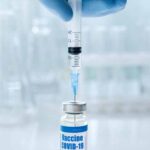PHILADELPHIA—Since March 2020, the world has been turned upside down by the COVID-19 pandemic. Rheumatologists must understand how to best protect and treat their patients with autoimmune conditions at risk for infection due to immunosuppressive therapy. At ACR Convergence 2022, the session titled, Latest COVID and Rheumatic Disease Therapies: What You Need to Know, provided a helpful review of this essential clinical topic.
Guidance
The first speaker was Rachael Perritt, PharmD, BCPS, clinical pharmacy specialist (ambulatory) at Penn Medicine, University of Pennsylvania Health System, Philadelphia. Dr. Perritt began her presentation by noting that patients with rheumatic diseases are at increased risk of developing—and dying from—COVID-19, compared with the general population. Specific risk factors for infection and death include being male; being age 65 or older; and having moderate to high rheumatic disease activity, hypertension or other cardiovascular diseases, and chronic lung diseases.
Dr. Perritt also noted that certain immunosuppressive medications, such as rituximab, sulfasalazine and glucocorticoids prescribed at more than 10 mg per day, have been shown to increase the risk of death from COVID-19. Many clinicians are surprised to see sulfasalazine on this list. She said this finding may be due to the characteristics of patients who are recommended for treatment with sulfasalazine (i.e., patients perceived to have higher baseline risk of infection may be preferentially treated with sulfasalazine over other disease-modifying anti-rheumatic drugs [DMARDs], and thus, these patients are more likely to experience severe COVID-19 disease).
Dr. Perritt also summarized general guidance from the ACR with respect to treating patients in the era of COVID-19, such as recommending social distancing, reducing in-person healthcare encounters when possible and using the lowest possible dose of glucocorticoids.
Vaccination against COVID-19 is clearly recommended for all patients and their family members, and patients should seek vaccination when disease is quiescent.
Dr. Perritt made reference to the ACR COVID-19 Vaccine Clinical Guidance Summary for Patients with Rheumatic and Musculoskeletal Diseases, which provides detailed recommendations for many immunosuppressive treatments and how these should be handled relative to timing of vaccination.1 In particular, Dr. Perritt explained, for patients to be treated with rituximab, it is ideal to perform vaccination against COVID-19 at least two to four weeks before rituximab dosing.
On this topic, it is worth stating that pre-exposure prophylaxis with tixagevimab and cilgevimab is indicated for patients who are moderately to severely immunocompromised and may not mount an immune response to COVID-19 vaccination; this would include patients on treatment with rituximab. Treatment with tixagevimab and cilgevimab should be given at least two weeks after vaccination and should be repeated every six months.



